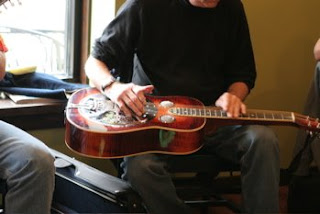
Bluegrass Saturday mornings are just one reminder why I love my job. Alternate Route- bluegrass band, have been playing Saturday mornings.
One of their members, RIP has since passed from the same cancer which took my brother in January. Needless to say they hold special meaning for us.
Jerry calls to let me know when they can or can't come. The 5 or 6 members are in something like 11 bands total, and they're busy. So we started putting out our sign to read "60% CHANCE OF BLUEGRASS."
Love it.
Limited edition T-shirts to follow.

So today, cupped 5 days worth of roasts on 4 coffees- and learned quite a bit.
It was eye opening to see that quick changes in temperature, even when offset by airflow so that the ambient temperature followed a gentle curve- can scorch the beans at any stage of the roast.
Especially the Brazil. Two scorched lots out of four test batches.
ugh.
Dumped those.
On the other hand, the roasts yesterday where I was most distracted and didn't tweak the burner but once or twice during each phase turned out the best.
Also the upper limit for the Tawar is 411 degrees- unless I start backing off the heat at least 90 seconds before first crack, which was borderline baked on the sample roast from 8.21. Steady gentle finish through first crack to 409 preserved the acid and sweetness while developing the mid-notes and diminishing that grassy note which exists below 405.
Did some tweaking to the profiles before starting today, with greatly improved results.
So - the coffees are revealing themselves, seems to take us about 8-10 roasts to really develop a solid profile. We'll continue to tweak of course as we cup daily, but we're at least fulfilling the promise of sample roasts- and production roasts from other roasters.
The El Salvador especially. Brought down the finish temperature a bit- well before second crack, but finishing three minutes after first crack at 418.
Here's a sample profile for the Guatemala Ixil 8.23 and some notes.
3.5 # batch.
Drop temp 392
initial gentle blowout to clear chaff/dust.
Minutes Temp Ambient Temp Burner
:
0:30 235.1
1 189 523 30%
1:30 188 530 31%
2 201.4 545 31%
2:30 233.0 542 (thermometry has caught up)
3:00 242
3:30 251.3
4:00 260.5
4:30 270.2 536 35%
5:00 278.9
5:30 288 538 42%
6:00 296
6:30 302 543 (Roast is Yellow- Color change most intense)
7:00 308.5 55%
7:30 314.6
8:00 319.7 61%
8:30 325.8 63%
9:00 331.9 560
9:30 338 567 65%
10:00 344 571 68%
10:30 351 575 many trowel samples..
11:00 364 581 ramping down... watching
11:30 371.6 50%
12:00 378 576
12:30 386 572 47%
13:00 1st Crack at 13:25 45%
13:30 565 finish up a bit... samples
14:00 399
14:30
15:00 406 sampling furiously.
15:30 smells changing.
15:55 409.6 beautiful.
Dump - 1:30 agitate. Stop motor, spread out. Coffee cools much faster when agitator arm is stopped- the airflow can find a pathway through the irregular bean shapes.
Pick and irregular beans/underripes- I usually do this for at least 5-10 minutes per batch while the auto-temp prepares for the next batch, drum cools a bit, stabilizes. I'll let this batch cool for at least 5-10 more minutes, dump, poke out any broken or smallish beans from the agitator tray.
This roast produced (cupping right out of the tray here.) A bright acidity with mild aroma (always a bit muted until the coffee has rested for at least 6-10 hours.) - bright citrus, some ripe red coffee cherry sweetness and wonderfully clean aftertaste. It was also a little bit effervescent, almost carbonated. I think perhaps this is a degassing thing. Carbolic acid? Someone with more chemistry can explain this to me.
I am fortunate to be able to work with great coffee.
Also, one of our neighbors, it turns, also grows Coffee in Hawaii. Small farm, maybe a hundred or so trees, she said, only a few years old. We discussed Will and Grace farms, what little I knew of their processing experiments. Gave her their information. She was also interested in a small roaster so I sent her straight to Diedrich. She was sold and said she would order one Monday.
We spent a while discussing the state of business in small towns, and the attitude of youth- people who feel entitled, feel like they can leave without notice or miss appointments or can't seem to manage their money.
I felt about eighty years old having this conversation, also apologetic, because until recently I didn't understand what it means to put roots down, build something from scratch. I might have been one of those kids who can just walk away from a job and who gives a flying care about anyone or anything but what's best for me right now...
But times are tough, and they are forcing people to really boil life down to the essentials. You can't take a bus two hours to work for a below living wage when you have no place to live and you really want to build a career in art or music someplace else.
Small towns are tough. Gas prices are tough. Food costs are tough.
And yet here we are, tasting, refining, pretending like the quality is all that matters, because, after all,
it is.

No comments:
Post a Comment